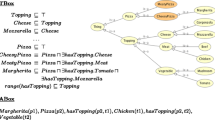Abstract
We show the decidability of the satisfiability problem for relative similarity logics that allow classification of objects in presence of incomplete information. As a side-effect, we obtain a finite model property for such similarity logics. The proof technique consists of reductions into the satisfiability problem for the decidable fragment FO2 with equality from classical logic. Although the reductions stem from the standard translation from modal logic into classical logic, our original approach (for instance handling nominals for atomic properties and decomposition in terms of components encoded in the reduction) can be generalized to a larger class of relative logics, opening ground for further investigations.
This work has been partially supported by the Polish-French Project “Rough-set based reasoning with incomplete information: some aspects of mechanization”, #7004.
Preview
Unable to display preview. Download preview PDF.
Similar content being viewed by others
References
Ph. Balbiani. Axiomatization of logics based on Kripke models with relative accessibility relations. In [Oe97], pages 553–578, 1997.
J. van Benthem. Modal logic and classical logic. Bibliopolis, 1983.
J. van Benthem. The range of modal logic-An essay in memory of George Gargov. Journal of Applied Non-Classical Logics, 1998. To appear.
P. Blackburn. Nominal tense logic. Notre Dame Journal of Formal Logic, 34(1):56–83, 1993.
S. Demri. A logic with relative knowledge operators. Journal of Logic, Language and Information, 1998. To appear.
S. Demri and E. Orłowska. Informational representability: Abstract models versus concrete models. In D. Dubois and H. Prade, editors, Linz Seminar on Fuzzy Sets, Logics and Artificial Intelligence, Linz, Austria. Kluwer Academic Publishers, February 1996. To appear.
L. Fariñas del Cerro and E. Orłowska. DAL-A logic for data analysis. In T. O’Shea, editor, ECAI-6, pages 285–294, September 1984.
G. Gargov and V. Goranko. Modal logic with names. Journal of Philosophical Logic, 22(6):607–636, December 1993.
E. Grädel, Ph. Kolaitis, and M. Vardi. On the decision problem for two-variable first-order logic. Bulletin of Symbolic Logic, 3(1):53–69, 1997.
G. Gargov and S. Passy. A note on boolean modal logic. In P. Petkov, editor, Summer School and Conference on Mathematical Logic’ 88, pages 299–309. Plenum Press, 1990.
E. Hemaspaandra. The price of universality. Notre Dame Journal of Formal Logic, 37(2):173–203, 1996.
B. Konikowska. A logic for reasoning about relative similarity. Studia Logica, 58(1):185–226, 1997.
H. Lewis. Complexity results for classes of quanticational formulas. Journal of Computer and System Sciences, 21:317–353, 1980.
M. Mortimer. On language with two variables. Zeit. für Math. Logik and Grund. der Math., 21:135–140, 1975.
E. Orlowska (ed.). Incomplete Information: Rough Set Analysis. Studies in Fuzziness and Soft Computing. Physica-Verlag, Heidelberg, 1997.
E. Orłowska and Z. Pawlak. Representation of nondeterministic information. Theoretical Computer Science, 29:27–39, 1984.
E. Orłowska. Logic of indiscernibility relations. In A. Skowron, editor, 5th Symposium on Computation Theory, Zaborów, Poland, pages 177–186. LNCS 208, Springer-Verlag, 1984.
E. Orłowska. Modal logics in the theory of information systems. Zeitschr. f. Math. Logik und Grundlagen d. Math., 30(1):213–222, 1984.
Z. Pawlak. Information systems theoretical foundations. Information Systems, 6(3):205–218, 1981.
L. Pacholski, W. Szwast, and L. Tendera. Complexity of two-variable logic with counting. In LICS, pages 318–327. IEEE, July 1997.
S. Passy and T. Tinchev. An essay in combinatory dynamic logic. Information and Computation, 93:263–332, 1991.
D. Vakarelov. Logical analysis of positive and negative similarity relations in property systems. In M. de Glas and D. Gabbay, editors, First World Conference on the Fundamentals of Artificial Intelligence, 1991.
D. Vakarelov. A modal logic for similarity relations in Pawlak knowledge representation systems. Fundamenta Informaticae, 15:61–79, 1991.
D. Vakarelov. Modal logics for knowledge representation systems. Theoretical Computer Science, 90:433–456, 1991.
M. Vardi. Why is modal logic so robustly decidable? In Descriptive complexity and finite models, A.M.S., 1997.
Author information
Authors and Affiliations
Editor information
Editors and Affiliations
Rights and permissions
Copyright information
© 1998 Springer-Verlag Berlin Heidelberg
About this paper
Cite this paper
Demri, S., Konikowska, B. (1998). Relative Similarity Logics are Decidable: Reduction to FO2 with Equality. In: Dix, J., del Cerro, L.F., Furbach, U. (eds) Logics in Artificial Intelligence. JELIA 1998. Lecture Notes in Computer Science(), vol 1489. Springer, Berlin, Heidelberg. https://doi.org/10.1007/3-540-49545-2_19
Download citation
DOI: https://doi.org/10.1007/3-540-49545-2_19
Published:
Publisher Name: Springer, Berlin, Heidelberg
Print ISBN: 978-3-540-65141-3
Online ISBN: 978-3-540-49545-1
eBook Packages: Springer Book Archive




